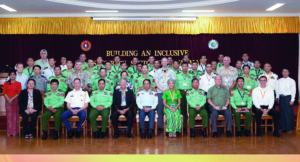
Thirty-one senior officials from the Myanmar and security organizations joined four members of the Daniel K. Inouye Asia-Pacific Center for Security Studies faculty for an Aug. 15 to 19 workshop focused on inclusiveness governance. Participants discussed measures Myanmar officials can take to build greater collaboration between military and civilian entities and across differing agencies.
As the nation of Myanmar transitions from military rule to an emerging democracy, its government has embarked on a peaceful political, economic and social transformation. The Daniel K. Inouye Asia-Pacific Center for Security Studies is supporting that transformation through a series of engagements and workshops, the latest held Aug. 15 to 19 in the nation’s capital Naypyitaw.
DKI APCSS conducted the workshop titled “Building an Inclusive Security Sector in Myanmar” in partnership with that nation’s National Defence College (NDC). Workshop coordinator Dr. Miemie Winn Byrd, said the August event was one of several steps in Myanmar’s building a more transparent, inclusive government.
“New models of collaborative and inclusive governance are required for the country to successfully address its complex challenges. In particular, the focus is on cohesive and healthy civil-military relations at all levels; this is essential to the country’s progress in areas such as maritime security, porous borders, trafficking and ethnic tensions, among others.”
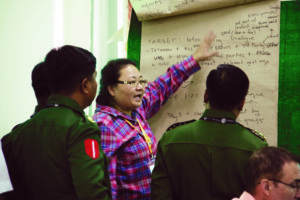
Dr. Imes Chiu, a faculty member with the Daniel K. Inouye Asia-Pacific Center for Security Studies, leads a seminar session during the Aug. 15 to 19 “Building and inclusive Security Sector in Myanmar” workshop.
Thirty-one senior officials from Myanmar government and security organizations took part along with four members of the DKI APCSS faculty. Subject matter experts shared information on key principles of security sector inclusivity, collaborative governance, effective interagency cooperation, civil-military cooperation and consultative decision making.
Associate DKI APCSS professor Dr. Imes Chiu, for example, presented the brief “Collaborative Governance and Inter-agency Framework using the Philippine Case Study.” Chiu walked participants through successes the Philippines government achieved in crisis response situations through deliberate inter-agency planning, operations coordination and professional networking. Experts also showcased case studies from Indonesia and the United States.
Daily break-out sessions followed topical discussions, enabling participants to coalesce their enhanced understanding into a set of objectives and associated courses of action.
Key recommended actions focused on increase face-to-face interaction among government and non-government entities and included:
- Establish a joint task force for assessing basic education conditions in military-controlled conflict areas;
- Develop a civilian-military higher education institution network and partnerships to share information, knowledge, programs and resources;
- Initiate a series of periodic and regular inter-agency inclusive workshops and training to increase awareness of collaborative governance;
- Establish a joint civilian-military research team to increase understanding of ethnic groups’ traditions, cultures and experiences; and
- Initiate combined and joint outreach programs at local levels in conflict and post-conflict areas.
“Participants actively analyzed needs and opportunities for inclusiveness and were enthusiastic in exploring how it can be applied,” said Byrd. “The warm relations established between DKI APCSS and NDC were remarkable and indicative of a high level of trust and confidence.”
A Myanmar participant related, “I was satisfied with the whole process of the workshop. I gained a lot of knowledge and experience.” Others stated that group discussions brought out a variety of perspectives, promoting cooperation and increased their understanding of the value of inclusion.
According to Byrd, the group selected a core cohort to implement the plan and track its progress over the next 12 months.
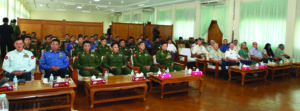
Security professionals take part in an Aug. 15 to 19 inclusion workshop held in Naypyitaw, Myanmar. The workshop, co-hosted by the Daniel K. Inouye Asia-Pacific Center for Security Studies and the Myanmar National Defense College, was designed to assist Myanmar in strengthening its
military-civilian cooperation.
Academic workshop lead for the NDC was Col. Nay Myo Hlaing, DKI APCSS alumnus and senior instructor at the NDC. His organization is the premier institution in Myanmar to educate future leaders of the Myanmar Armed Forces and civilian government officials for high-level policy, command and staff responsibilities by conducting an executive-level course of study in national, regional, and international security strategies. The curriculum emphasizes the joint and interagency perspectives at the operational and strategic levels.
DKI APCSS is a Department of Defense institute that provides a program of executive security education, professional exchanges and outreach events, both in Hawaii and throughout the Asia-Pacific region.
The Center supports the U.S. Pacific Command by developing and sustaining relationships among security practitioners and national security establishments throughout the region. DKI APCSS’ mission is to build capacities and communities of interest by educating, connecting and empowering security practitioners to advance Asia-Pacific security. It is one of the Department of Defense’s five regional security studies centers.
Since opening in 1995, more than 10,300 alumni representing over 122 countries and territories have attended DKI APCSS courses and workshops.
-END-



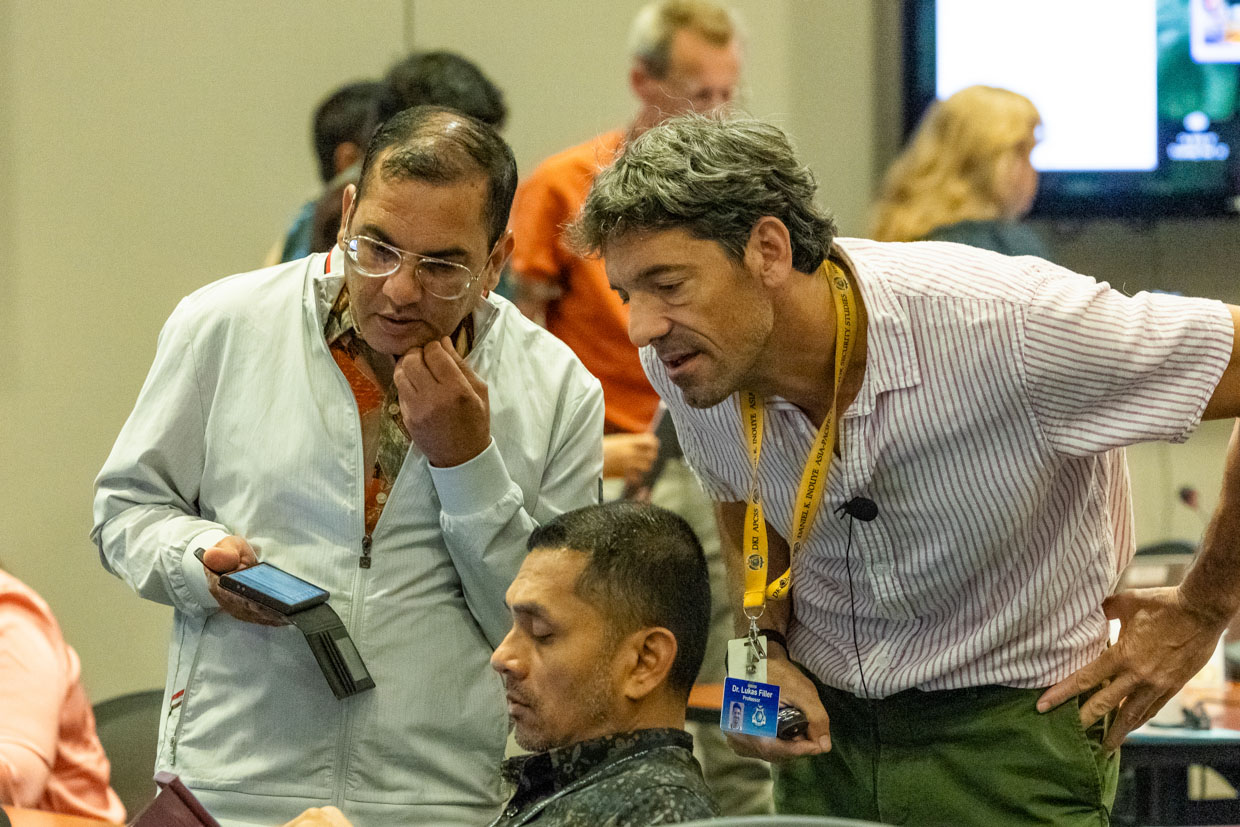

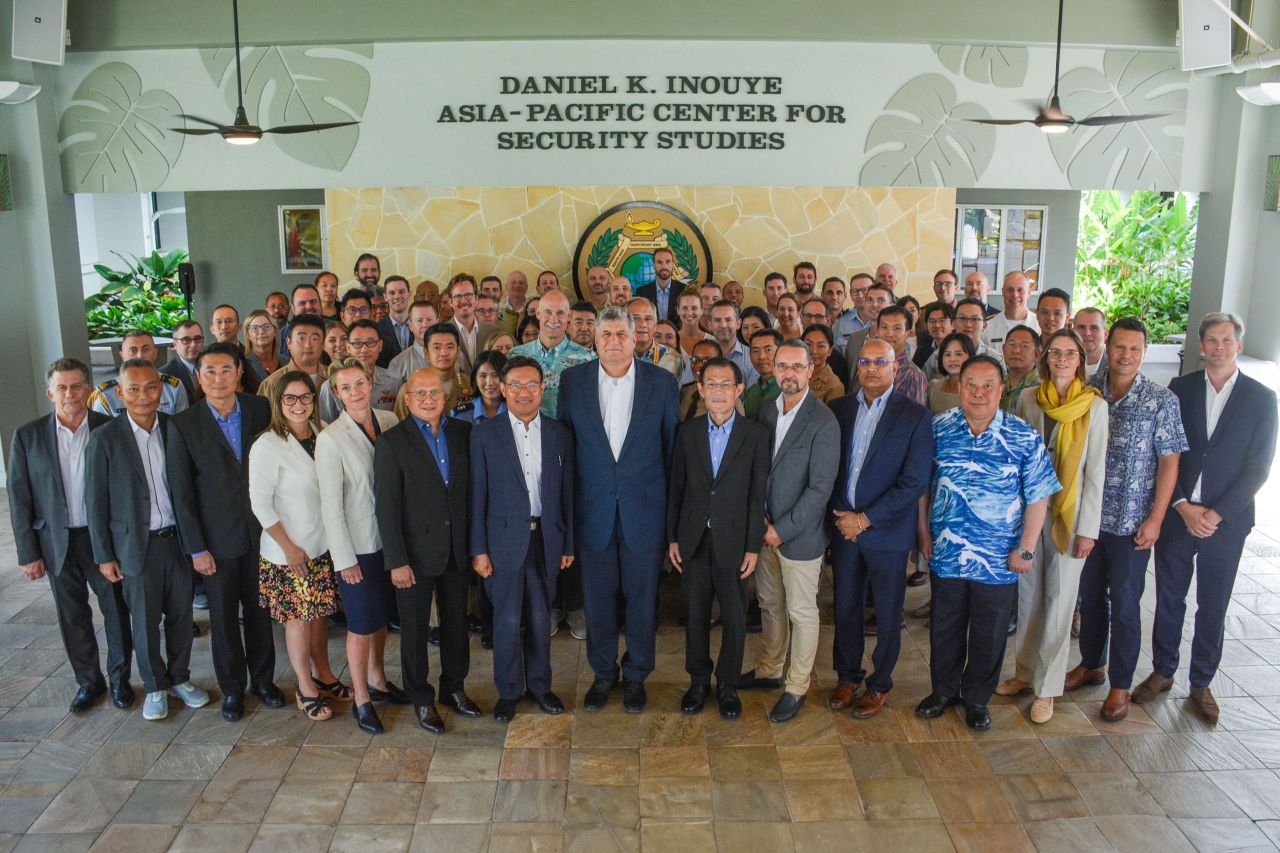


Leave A Comment